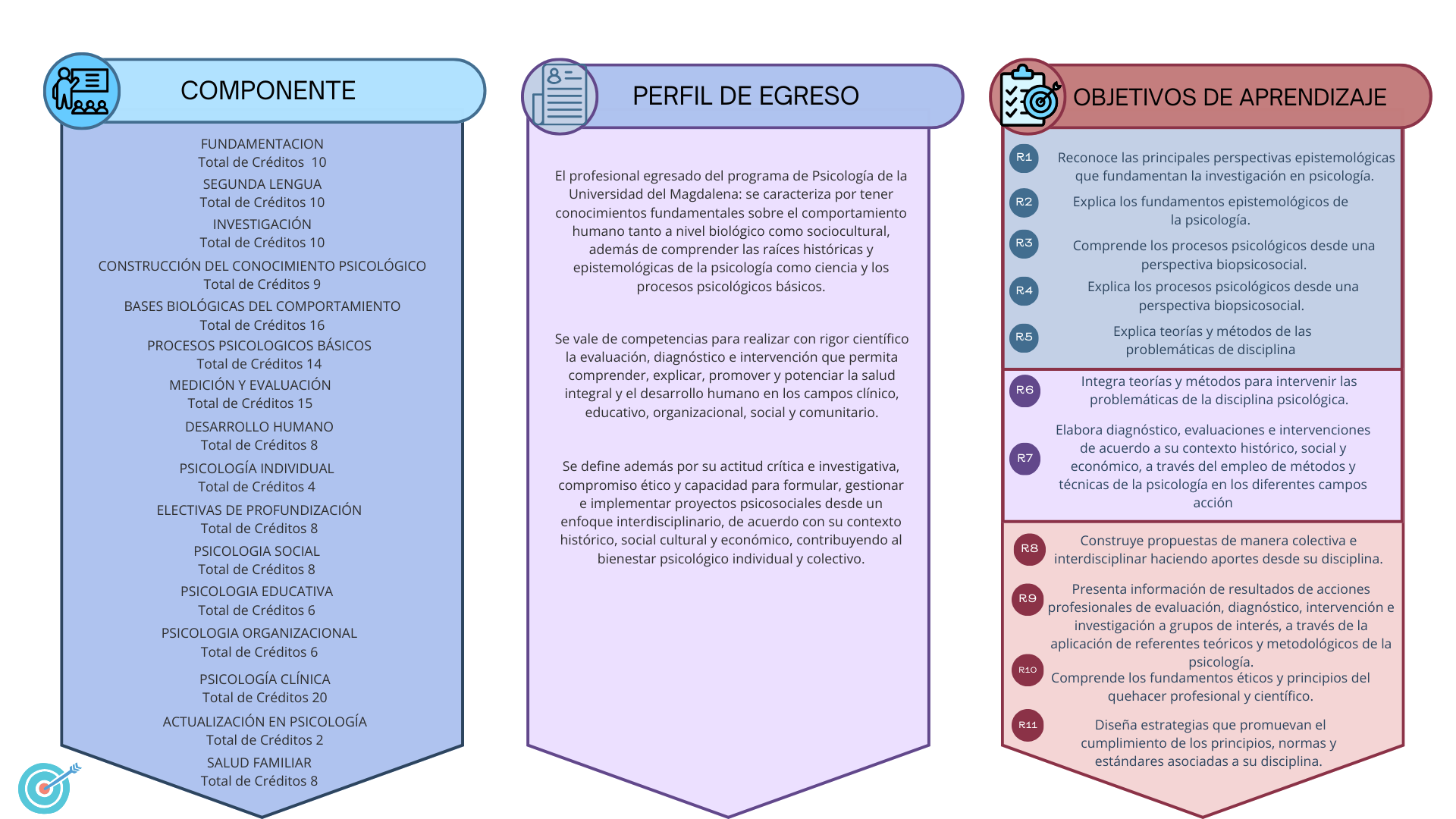Misión
Formar psicólogos desde una perspectiva de salud integral, privilegiando el desarrollo de competencias y el aprendizaje autónomo, que permitan al egresado intervenir de manera interdisciplinaria, con apoyo en la investigación científica y la extensión, en la comprensión del ser humano en sus diversas dimensiones y en la búsqueda de acciones de transformación individual y social a nivel local, regional, nacional e internacional.
Visión
El Programa de Psicología de la Universidad del Magdalena, en el año 2025 será reconocido por su alta calidad para formar profesionales que aporten a la salud integral y a la transformación social, constituyéndose en un referente local, regional, nacional e internacional, que contribuye a la calidad de vida y al bienestar de la sociedad en general.
Historia
La creación del Programa de Psicología responde al cumplimiento de la función social que la Universidad del Magdalena debe desarrollar con la comunidad de la Región Caribe Colombiana, en general, y del Magdalena, en particular. Dicho programa se enmarca dentro del macroproyecto “Refundar la Universidad, un proyecto colectivo”, que busca fortalecerla institucional y socialmente para contribuir al desarrollo Departamental y Regional.
La construcción del Programa de Psicología se adelantó como un proceso de investigación, cuya pretensión central siempre fue elaborar una propuesta curricular que, de una parte, consultara las reflexiones y discusiones acerca del desarrollo de la Psicología como ciencia y como profesión, y de otra parte, recogiera las tendencias, criterios y enfoques actuales respecto a la formación que requiere el psicólogo(a) para desempeñarse de manera competente en la sociedad de hoy, en una perspectiva histórica y con visión de futuro.
Para el logro de estos propósitos se diseñó un proceso metodológico que contempló los siguientes momentos:
Conformación del equipo dinamizador del proceso y elaboración de un plan de trabajo.
Conceptualización sobre la Psicología como ciencia y como profesión. Para esto se generó la reflexión y discusión alrededor de los siguientes interrogantes:
¿Cuál es el objeto de estudio de la Psicología como ciencia?
¿Cuáles han sido los desarrollos más recientes en la ciencia psicológica?
¿Cuáles son las funciones, tareas y/o roles que el psicólogo(a) debe asumir en la actualidad?
¿Cuáles son las dificultades y/o problemas más comunes que el psicólogo de hoy debe enfrentar?
¿Cuáles son las tendencias predominantes en la formación de psicólogos(a)?
El análisis crítico de estos interrogantes sirvió de base para caracterizar el perfil del profesional que se pretende formar, teniendo en cuenta el Proyecto Educativo Institucional de la Universidad del Magdalena, las tendencias contemporáneas en la formación de psicólogos y las necesidades del contexto local, regional y nacional.
De igual manera, se hizo la Revisión y análisis de Planes de Estudio de las Universidades que ofrecen Programas de Psicología a nivel regional, nacional e internacional, en aspectos relacionados con la misión, visión, objetivos, perfil, ejes de formación, estructura curricular, organización de la investigación y las prácticas profesionales, áreas de énfasis, laboratorios, entre otros.
Los resultados obtenidos del análisis e interpretación de la información constituyeron, en esencia, los insumos básicos para el planteamiento del bosquejo general de la propuesta curricular de nuestro Programa.
Cabe destacar en este momento del proceso, la participación de los Decanos y Docentes de las siguientes Universidades: Católica de Colombia, INCCA, Javeriana, Los Andes, Konrad Lorenz en Santafé de Bogotá, lo mismo que la Autónoma de Bucaramanga y la Pontificia Bolivariana de esa misma ciudad, la Universidad del Norte y la Metropolitana en Barranquilla y, finalmente, la Universidad Cooperativa de Colombia y la Universidad Abierta y a Distancia en Santa Marta, también se Presentó la propuesta ante un grupo de psicólogos de la ciudad de Santa Marta, con el propósito de enriquecerla y validarla; este ejercicio fue importante y genero mucho interés en este proyecto de construcción curricular e hicieron aportes significativos para su consolidación.
Luego se hizo la sustentación ante el Consejo Académico de la Universidad del Magdalena para su aprobación y legalización. Previo a la culminación de este proceso el Consejo Superior, mediante Acuerdo 017 del 29 de octubre de 1999, aprueba el Proyecto de desarrollo del Programa de Psicología. En el mes de septiembre de 2000 fue enviada la propuesta curricular del Programa al ICFES, siendo incorporado al Sistema Nacional de Información de la Educación Superior el día 17 de mayo de 2001 con el código N° 121341500004700111100. Finalmente, el Programa inicia sus labores académicas en el primer semestre del año 2002
Informes de gestión
Acreditación
MINISTERIO DE EDUCACIÓN NACIONAL
Resolución N° 012685 del 24 DE JUL 2023.
Por medio de la cual se otorga la Acreditación en Alta Calidad al Programa de Psicología de la Universidad del Magdalena- UNIMAGDALENA (por 6 años), ofrecido bajo la modalidad presencial en Santa Marta (Magdalena), y se renueva de oficio el Registro calificado por (7 años).
Resultados del estudiante
El Consejo Nacional de Educación Superior (CESU) y el Ministerio de Educación Nacional (MEN), en el contexto del Sistema de Aseguramiento de la Calidad de la Educación Superior, establecieron mediante normatividad los resultados de aprendizaje (RA) como evidencia de la calidad. Tanto el Acuerdo 02 de 2020 del CESU como el Decreto 1330 de 2019, que modifica el Decreto 1075 de 2015 del MEN, conciben los resultados de aprendizaje como “las declaraciones expresas de lo que se espera que un estudiante conozca y demuestre en el momento de completar su programa académico. Los resultados de aprendizaje deben ser coherentes con las necesidades de formación integral y con las dinámicas propias de la formación a lo largo de la vida necesarias para un ejercicio profesional y ciudadano responsable. Por lo tanto, se espera que los resultados de aprendizaje estén alineados con el perfil de egreso planteado por la institución y por el programa específico”.
De acuerdo a los lineamientos establecidos, el Programa de Psicología aprobó mediante Consejo de Facultad y previo estudio realizado por el comité curricular del programa, los siguientes resultados de aprendizaje enlazados en todas sus asignaturas y los cuales guardan estrecha relación con el perfil de egreso:

